Senin, 18 November 2019
Hong Kong protest: police and protesters in standoff at university campus – watch live - Guardian News
https://www.youtube.com/watch?v=8YAR9KX-ixE
2019-11-18 07:40:18Z
52780435950054
Minggu, 17 November 2019
Hong Kong police officer shot with arrow, protesters set fires as Chinese troops appear to clean streets - Fox News
As clashes continue to bring chaos to the streets of Hong Kong, with protesters setting fires and slinging arrows, Chinese soldiers were seen arming themselves with brooms over the weekend for the massive cleanup of debris from city streets.
A police officer in Hong Kong was struck in the leg with an arrow on Sunday as another day of violent clashes erupted between pro-democracy protesters who blocked a major road tunnel under the city's harbor and occupied a university campus and police, who deployed tear gas and projectiles.
After holding their ground for most of the day with gasoline bombs, bricks and nails strewn on area roadways, protesters began retreating into Hong Kong Polytechnic University near sunset, fearing they would be trapped as police fired tear gas volleys and approached from the opposite direction.
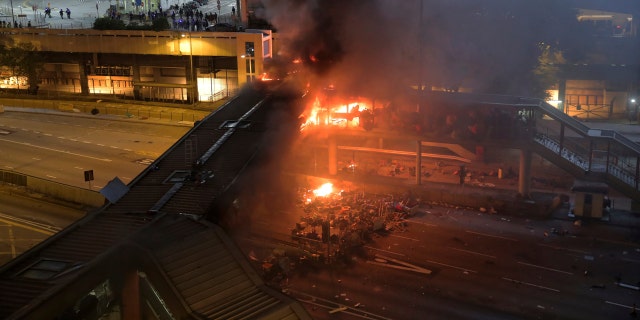
A fire burns on a bridge occupied by protestors over a highway leading to the Cross Harbour Tunnel in Hong Kong, Sunday, Nov. 17, 2019. (AP Photo/Kin Cheung)
Fires were set to bridges leading to Polytechnic as protesters tried to keep police from advancing on their campus stronghold. Orange flames extended the length of a footbridge over the roadway entrance to the Cross-Harbour Tunnel.
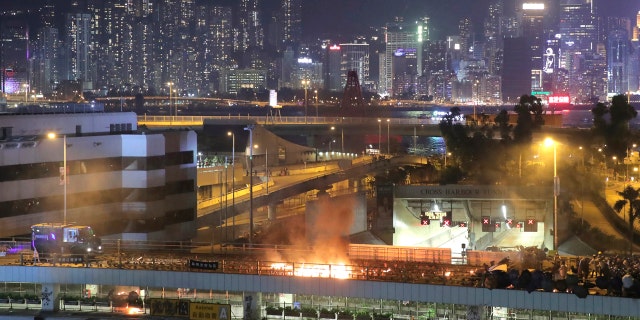
An armored police vehicle, left, approaches a burning barricade built by protestors near the entrance to the Cross Harbour Tunnel in Hong Kong, Sunday, Nov. 17, 2019. (AP Photo/Kin Cheung)
Police had shut down access to the area and massed earlier Sunday in an apparent attempt to surround protesters. Some retreated inside the campus, while others remained outside to deter any advance.
Protestors hurled Molotov cocktails as armored police vehicles approach their barricades on the bridge over the highway, causing one of the vehicles to catch fire and others to reverse away.
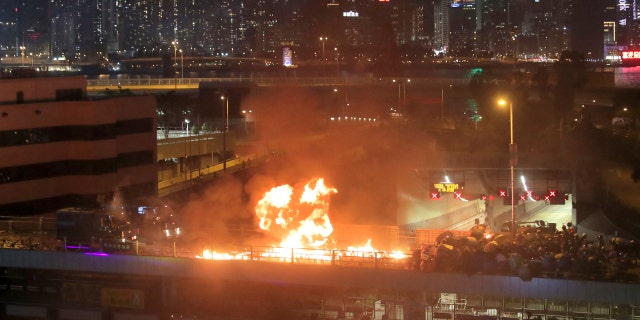
Protestors hurl molotov cocktails as armored police vehicles approach their barricades on a bridge over a highway leading to the Cross Harbour Tunnel in Hong Kong, on Sunday. (AP Photo/Kin Cheung)
State Department spokesperson Morgan Ortagus said Sunday on "Fox & Friends" the images coming out of Hong Kong on Sunday were "certainly troubling," and said that China should honor its commitments as it relates to Hong Kong.
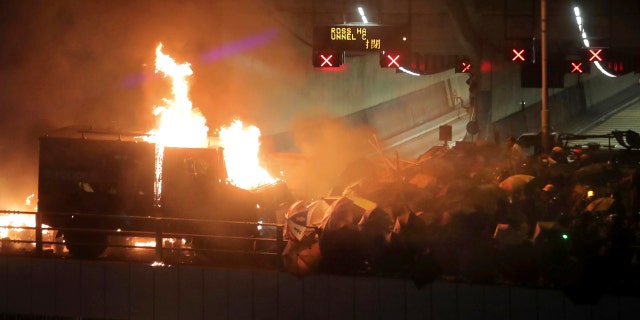
An armored police vehicle catches fire after being hit by molotov cocktails thrown by protestors, at right, on a bridge over a highway leading to the Cross Harbour Tunnel in Hong Kong, Sunday, Nov. 17, 2019. (AP Photo/Kin Cheung)
"We think that there needs to be a dialogue between the government of Hong Kong and it's citizens," Ortagus said. "We're certainly calling for a peaceful resolution and for peaceful protests."
HONG KONG OFFICIAL ASSAULTED IN 'BARBARIC ATTACK' BY PRO-DEMOCRACY PROTESTERS IN LONDON
Hong Kong Police said the officer from the media liaison team was struck in the leg by an arrow around 2 p.m. and taken to an area hospital. Photos on the department’s Facebook page show the arrow sticking out of the back of the officer’s lower leg through his pants.
WARNING: GRAPHIC PHOTO
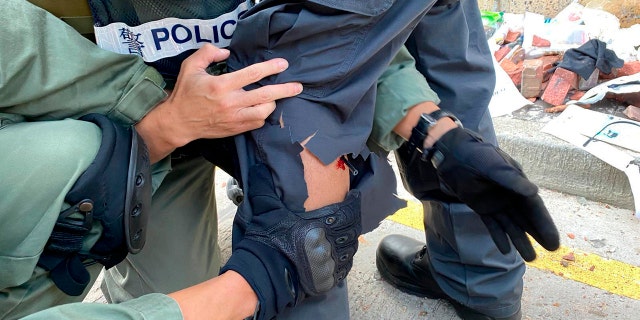
In this photo released by the Hong Kong Police Department, police prepare to remove an arrow from the leg of a fellow officer during a confrontation with protestors at the Hong Kong Polytechnic University in Hong Kong on Sunday. (Hong Kong Police Dept. via AP)
Another officer's visor was struck by a metal ball, though he was not injured, according to the Hong Kong Free Press.
“Police warn that the violent activities in the Hong Kong Polytechnic University have escalated to rioting," police said in a statement to the news outlet, "Anyone who stays behind or assists rioters may be liable to the offense of ‘Taking Part in a Riot’," which could land someone up to 10 years in jail.
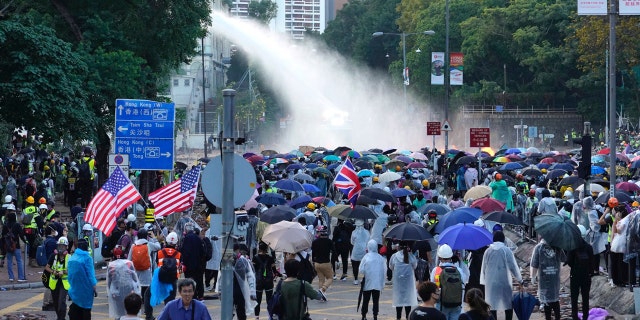
Protesters hold American flags as an armored police vehicle sprays water during a confrontation near the Hong Kong Polytechnic University in Hong Kong, Sunday, Nov. 17, 2019. (AP Photo/Vincent Yu)
The use of bows and arrows, along with gasoline bombs launched with catapults, threatened to escalate the violence in the more than five-months-long anti-government movement. Protesters are trying to keep the pressure on Hong Kong leaders for full democracy for the territory, who have rejected most of their demands.
After a week of occupations at several major campuses in the last week, protesters have mainly converged on Sunday at Polytechnic, blocking access to one of the three main road tunnels that link Hong Kong Island with the rest of the city.
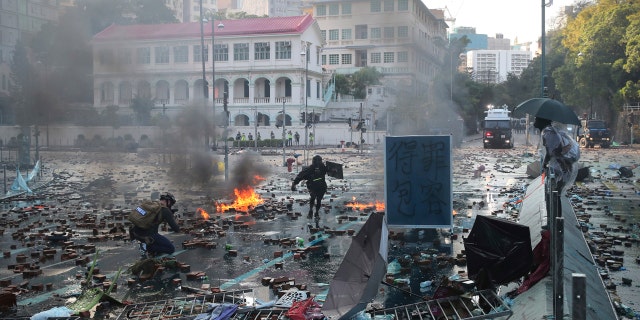
Protesters react during a confrontation at the Hong Kong Polytechnic University in Hong Kong, Sunday, Nov. 17, 2019. (AP Photo/Kin Cheung)
A large group of protesters tossed bricks in the blocked main thoroughfare in the Mongkok district, as they also deployed makeshift roadblocks to prevent vehicles from getting through.
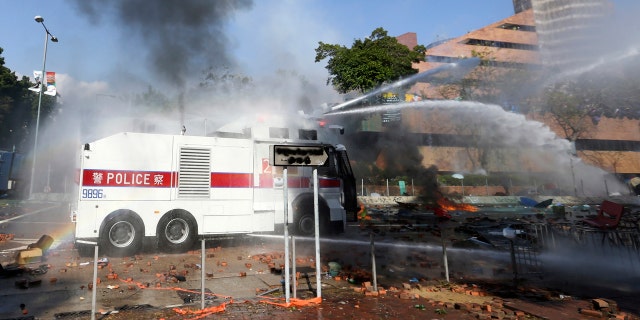
An armored police vehicle sprays water during a confrontation with protesters at the Hong Kong Polytechnic University in Hong Kong, Sunday, Nov. 17, 2019. (AP Photo/Achmad Ibrahim)
Police responded by shooting tear gas at protesters and deploying water cannons that stream blue-dyed water to drench protesters. By later in the day, authorities deployed an armored truck identified as a "Long Range Acoustic Device” that a reporter said sounded like a "loud, shrill noise" similar to a car alarm.
Police told the Hong Kong Free Press that the LRAD was deployed to "convey important messages over a long range in a noisy environment."
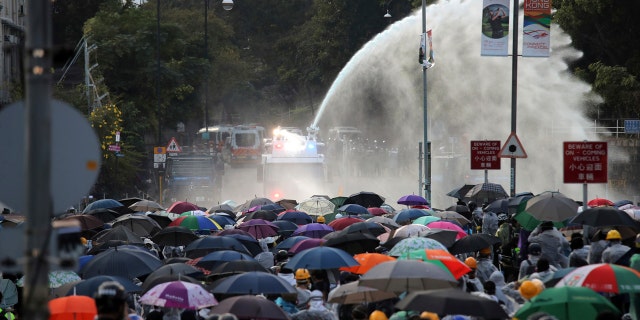
Protesters react as an armored police vehicle sprays water during a confrontation at Hong Kong Polytechnic University in Hong Kong, Sunday, Nov. 17, 2019. (AP Photo/Kin Cheung)
“Unlike what is said in individual media reports, the LRAD does not generate ultra-low frequency which will cause dizziness, nausea or loss of sense of direction," the force told the news outlet.
Sunday’s daytime faceoff came after a pitched battle at night in which the two sides exchanged tear gas and gasoline bombs that left fires blazing in the street. Many protesters retreated inside the Polytechnic campus, where they have barricaded entrances and set up narrow access control points.
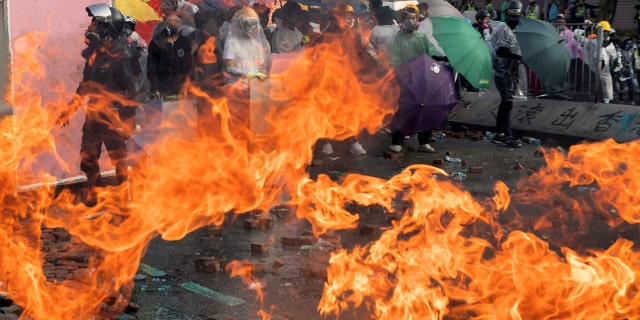
Protesters watch as a fire burns during a confrontation with police at Hong Kong Polytechnic University in Hong Kong, Sunday, Nov. 17, 2019. (AP Photo/Ng Han Guan)
On Saturday, Chinese Army troops stationed in Hong Kong appeared to clean up the streets, which protesters had strewn with debris to slow down any police advances while they had been on the campus. The People's Liberation Army (PLA) soldiers, dressed in black shorts and olive drab T-shirts, joined the clean-up outside Hong Kong Baptist University, the site of clashes earlier in the week.
The soldiers, jogging in formation, carrying brooms and singing in cadence, were a rare sight on the streets of the city.
China maintains a garrison of about 10,000 soldiers, but they can't operationally deploy in the city without a request from the Hong Kong government. The government said that it had not requested the military’s assistance, describing it as a "voluntary community activity."
The dozens of troops from nearby barracks, alongside firefighters and citizens, helped street cleaners and picked up paving stones, rocks and other obstacles that had cluttered the street and prevented traffic from flowing. Hong Kong riot police kept watch from nearby streets.
CLICK HERE FOR THE FOX NEWS APP
Soldiers from the PLA have been seen on the streets only once since the former British colony was handed back to China in 1997, to clean up from a typhoon in 2018, according to Sky News.
Opposition lawmakers criticized the Chinese military for joining a cleanup to remove debris from streets near Hong Kong Baptist University on Saturday.
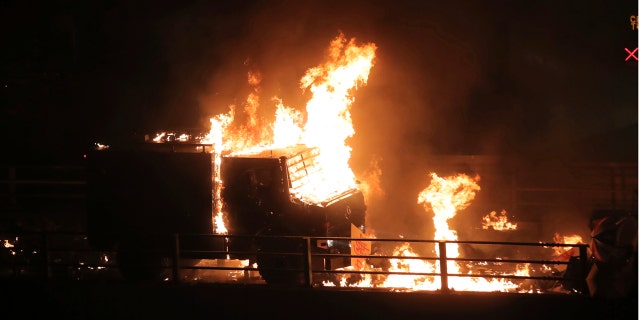
An armored police vehicle catches fire after being hit by Molotov cocktails thrown by protesters in Hong Kong on Sunday. (AP Photo/Kin Cheung)
The Education Bureau announced that classes from kindergarten to high school would be suspended again on Monday because of safety concerns. Classes have been canceled since Thursday after the bureau came under criticism for not doing so earlier.
The Associated Press contributed to this report.
https://www.foxnews.com/world/hong-kong-police-officer-shot-with-arrow-protest-fires-chinese-troops-streets
2019-11-17 14:18:56Z
52780435950054
Prince Andrew 'bulldozed' his way into BBC Newsnight interview - BBC News
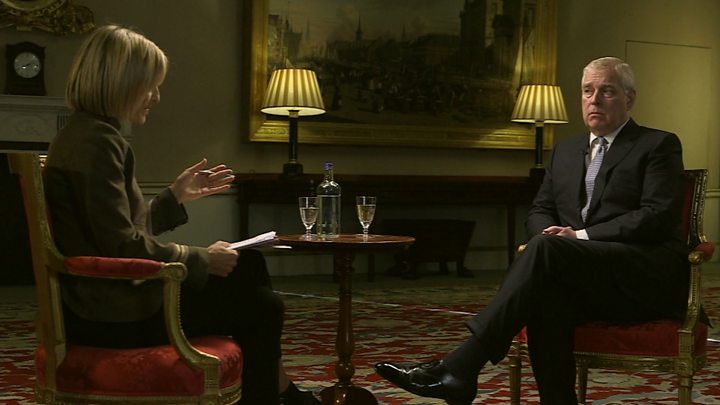
Media playback is unsupported on your device
Prince Andrew "bulldozed his way" into a BBC interview which did more damage than good, according to Royal commentator Dickie Arbiter.
The ex-Buckingham Palace press officer queried why the prince decided to answer questions about his links with convicted sex offender Jeffrey Epstein.
The prince said the fallout over Epstein's arrest had been "a constant sore" in the Royal Family.
A lawyer for Epstein's accusers urged the prince to talk to US authorities.
The prince's decision to speak so candidly about his relationship with Epstein - who died in prison after he was charged with sex trafficking - and answer allegations about sex with a teenage girl was questioned by a number of royal experts.
Mr Arbiter described the interview as "excruciating".
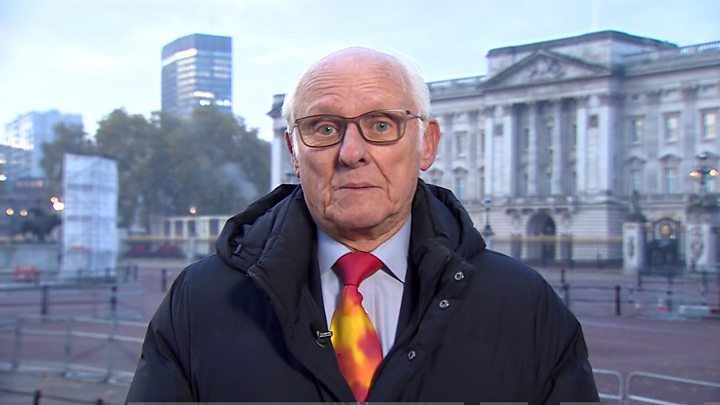
Media playback is unsupported on your device
For several months the Duke of York had been facing questions over his ties to Epstein - an American financier who, at the age of 66, took his own life while awaiting trial on sex-trafficking charges.
Prince Andrew "categorically" denied having an sexual contact with Virginia Giuffre, who claimed she was forced to have sex with Prince Andrew on three occasions when she was a teenager.
The first occasion, she said, took place when she was aged 17.
Asked about the prince's decision to be interviewed by BBC Newsnight's Emily Maitlis, Mr Arbiter said he thought a lot of questions would be asked in Buckingham Palace.
He said: "They will be wondering: was this the right decision? Was the right decision made? Who made the decision to put him on? Did he make it himself or did he seek advice within the palace?
"My guess is that he bulldozed his way in and decided he was going to do it himself without any advice.
"Any sensible-thinking person in the PR business would have thrown their hands up in horror at the very suggestion that he puts himself up in front of a television camera to explain away his actions and his friendship with Jeffrey Epstein."
Mr Arbiter said he believed the interview would have an impact on the Duke of York's relationships with various charities.
'Sign of arrogance'
Other royal experts also questioned the prince's decision to speak so publicly about his relationship with Epstein.
Royal biographer Angela Levin said she was gripped by the interview but felt it was "ill-judged" to offer insights into his life with Epstein.
"Unfortunately it was a sign of his arrogance," she said. "He has always been arrogant.
"The Queen's motto is don't complain don't explain. I think in her heart she will be extremely embarrassed.
"I know for a fact Prince Andrew does not listen to his advisers.
"A very senior member of the press team left suddenly two weeks ago and the implication is he would not have approved of what Prince Andrew did."
Former BBC royal correspondent Jennie Bond said the interview reminded her of one Princess Diana gave to Panorama in 1995 where she "spilled her soul".
Mrs Bond added that Princes Andrew's lack of remorse in his interview was a "glaring hole".
'Prince or pauper'
Gloria Allred, who is representing some of the young women abused by Epstein said "there is so much truth that is yet to be revealed".
She added: "The charges made by Ms Roberts, whom I do not represent but she is one of the accusers, against Prince Andrew are very, very serious charges.
"Whether you are a prince or a pauper, if anyone has evidence or information that might be relevant to an investigation of a criminal case that person should provide it."
In the lengthy interview, which UK viewers can watch in full on BBC iPlayer or on YouTube elsewhere in the world, the duke said that:
- On the date Virginia Giuffre says he had sex with her - 10 March, 2001, he had taken his daughter to Pizza Express in Woking for a party before spending the night at home
- He dismissed claims he was sweating profusely because he had a "peculiar medical condition" meaning he cannot sweat, caused by an overdose of adrenaline in the Falklands War
- He had commissioned investigations into whether a photograph of him with Ms Giuffre had been faked, but they were inconclusive
- Speaking out about his relationship with the financier had become almost "a mental health issue" for him
- He would testify under oath about his relationship with Ms Giuffre if "push came to shove", and his lawyers advised him to
- He was unaware of an arrest warrant against Epstein when he invited the financier to Princess Beatrice's 18th birthday party at Windsor Castle
- He did not regret his friendship with Epstein because of "the opportunities I was given to learn" from him about trade and business
Analysis
BBC's Royal correspondent Nicholas Witchell
The interview has been heard and Prince Andrew's answers have been noted with incredulity in some quarters.
The reaction to his words in most cases has been negative and the consensus, in PR terms, is that the interview was extremely ill-advised.
There is a feeling of weary resignation from those who know of Prince Andrew as it was supposed to be an interview for which a line could be drawn under the story for the Duke of York and allow him to move on.
That moment is certainly some way off.
https://www.bbc.com/news/uk-50450207
2019-11-17 13:19:57Z
52780437489594
Venice closes St Mark’s Square as high water threatens again - The Guardian
[unable to retrieve full-text content]
- Venice closes St Mark’s Square as high water threatens again The Guardian
- Venice sees worst floods in 50 years CNN
- Venice Flooding Reveals A Real Hoax About Climate Change - Framing It As “Either/Or” Forbes
- Waters Close Over Venice The New York Times
- Venice is drowning. It’s a warning of what’s to come. The Washington Post
- View full coverage on Google News
https://www.theguardian.com/world/2019/nov/17/venice-closes-st-marks-square-as-high-water-threatens-again
2019-11-17 13:28:00Z
52780436944783
HK police fire tear gas as protesters injure officer with arrow - Al Jazeera English
A Hong Kong police officer has been hit in the leg by an arrow as authorities used tear gas and water cannon to drive away protesters occupying a university campus and blocking a major road tunnel under the city's harbour.
The clashes on Sunday came after a day of relative calm that followed one of the most violent weeks in more than five months of anti-government unrest in the semi-autonomous Chinese territory.
More:
Police said the arrow struck a media liaison officer and he was taken to a hospital. Photos on the department's Facebook page show the arrow sticking out of the back of the officer's lower leg through his pants.
Al Jazeera's Divya Gopalan, reporting from Hong Kong, said the university and its surroundings is the last stand of the protesters.
"This is where the protesters still feel that they can send a message to the government that they are able to stop the city from functioning normally and disrupt the city," she said.
The pro-democracy protesters held their ground for most of the day, as water cannon trucks drove over bricks and nails strewn by demonstrators to spray them at close range.
They began retreating into Hong Kong Polytechnic University near sunset, fearing they would be trapped as police fired tear gas volleys and approached from the opposite direction.
New tactics
In the university courtyard, civil engineer Joris, 23, said he was prepared to go to jail in his fight against the government. Those shooting arrows were protecting themselves, he said.
"The police violence has been over the top," he told Reuters news agency. "The protesters have been reacting to the police. We haven't fought back as much as we could. I would be prepared for jail. We are fighting for Hong Kong."
Reuters reported that a high-pitched wailing came from at least one police vehicle, suggesting a new tactic to try to clear the crowds. Police confirmed the use of a "long-range acoustic device".
Chinese soldiers in a base close to the university were seen monitoring developments with binoculars, some dressed in riot gear with canisters on their chests.
On Saturday, troops belonging to China's People's Liberation Army (PLA) briefly left their barracks to help Hong Kong residents clean up debris left by demonstrators, in a move that could stoke further controversy over the city's status.
Since early June, Hong Kong has been rocked by protests triggered by a bill that would have allowed the extradition of accused individuals to mainland China to stand trial.
Although the proposed law has now been withdrawn, public anger has been driven by the authorities' refusal to address protesters' demands for an independent inquiry against alleged police brutality; amnesty for the nearly 600 people charged with offences stemming from the protests; a retraction of police claims that protesters are guilty of rioting; and universal suffrage to elect the full legislature and chief executive.
In recent weeks, calls for disbanding, or at least reorganising, the police force have grown out of public anger, with critics alleging indiscriminate and rampant use of force.
![Protesters are seen on the bridge above the Cross Harbour Tunnel during clashes with police outside Hong Kong Polytechnic University (PolyU) in Hong Kong, China November 17, 2019. [Adnan Abidi/Reuters] Protesters take cover during clashes with police outside Hong Kong Polytechnic University](https://www.aljazeera.com/mritems/Images/2019/11/17/f988bde865cb47aeaf12cb312b2e8eee_18.jpg)
The protesters held their ground for most of the day [Adnan Abidi/Reuters]
SOURCE: Al Jazeera and news agencies
https://www.aljazeera.com/news/2019/11/hong-kong-fire-tear-gas-protesters-injure-officer-arrow-191117111609972.html
2019-11-17 12:31:00Z
52780435950054
Hong Kong police officer shot with arrow during university siege - CNN

University campuses fortified


Protests escalate

CNN's Eric Cheung, Maisy Mok, Sandi Sidhu and Brad Lendon contributed to this report.
https://www.cnn.com/2019/11/17/asia/hong-kong-protests-november-17-intl-hnk/index.html
2019-11-17 10:43:00Z
52780435950054
Hong Kong police officer shot with arrow during university siege - CNN

University campuses fortified


Protests escalate

CNN's Eric Cheung, Maisy Mok, Sandi Sidhu and Brad Lendon contributed to this article.
https://www.cnn.com/2019/11/17/asia/hong-kong-protests-november-17-intl-hnk/index.html
2019-11-17 10:26:00Z
52780435950054
